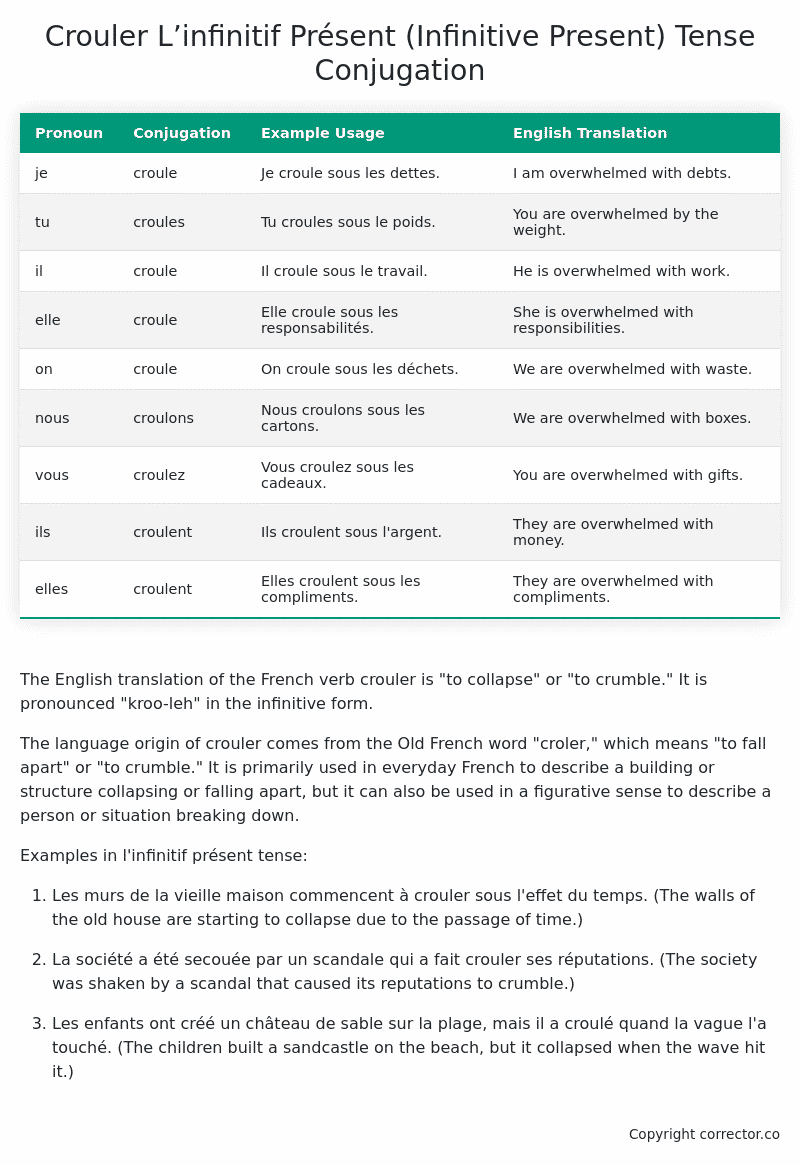L’infinitif Présent (Infinitive Present) Tense Conjugation of the French Verb crouler
Introduction to the verb crouler
The English translation of the French verb crouler is “to collapse” or “to crumble.” It is pronounced “kroo-leh” in the infinitive form.
The language origin of crouler comes from the Old French word “croler,” which means “to fall apart” or “to crumble.” It is primarily used in everyday French to describe a building or structure collapsing or falling apart, but it can also be used in a figurative sense to describe a person or situation breaking down.
Examples in l’infinitif présent tense:
-
Les murs de la vieille maison commencent à crouler sous l’effet du temps. (The walls of the old house are starting to collapse due to the passage of time.)
-
La société a été secouée par un scandale qui a fait crouler ses réputations. (The society was shaken by a scandal that caused its reputations to crumble.)
-
Les enfants ont créé un château de sable sur la plage, mais il a croulé quand la vague l’a touché. (The children built a sandcastle on the beach, but it collapsed when the wave hit it.)
Table of the L’infinitif Présent (Infinitive Present) Tense Conjugation of crouler
| Pronoun | Conjugation | Example Usage | English Translation |
|---|---|---|---|
| je | croule | Je croule sous les dettes. | I am overwhelmed with debts. |
| tu | croules | Tu croules sous le poids. | You are overwhelmed by the weight. |
| il | croule | Il croule sous le travail. | He is overwhelmed with work. |
| elle | croule | Elle croule sous les responsabilités. | She is overwhelmed with responsibilities. |
| on | croule | On croule sous les déchets. | We are overwhelmed with waste. |
| nous | croulons | Nous croulons sous les cartons. | We are overwhelmed with boxes. |
| vous | croulez | Vous croulez sous les cadeaux. | You are overwhelmed with gifts. |
| ils | croulent | Ils croulent sous l’argent. | They are overwhelmed with money. |
| elles | croulent | Elles croulent sous les compliments. | They are overwhelmed with compliments. |
Other Conjugations for Crouler.
Le Present (Present Tense) Conjugation of the French Verb crouler
Imparfait (Imperfect) Tense Conjugation of the French Verb crouler
Passé Simple (Simple Past) Tense Conjugation of the French Verb crouler
Passé Composé (Present Perfect) Tense Conjugation of the French Verb crouler
Futur Simple (Simple Future) Tense Conjugation of the French Verb crouler
Futur Proche (Near Future) Tense Conjugation of the French Verb crouler
Plus-que-parfait (Pluperfect) Tense Conjugation of the French Verb crouler
Passé Antérieur (Past Anterior) Tense Conjugation of the French Verb crouler
Futur Antérieur (Future Anterior) Tense Conjugation of the French Verb crouler
Subjonctif Présent (Subjunctive Present) Tense Conjugation of the French Verb crouler
Subjonctif Passé (Subjunctive Past) Tense Conjugation of the French Verb crouler
Subjonctif Imparfait (Subjunctive Imperfect) Tense Conjugation of the French Verb crouler
Subjonctif Plus-que-parfait (Subjunctive Pluperfect) Tense Conjugation of the French Verb crouler
Conditionnel Présent (Conditional Present) Tense Conjugation of the French Verb crouler
Conditionnel Passé (Conditional Past) Tense Conjugation of the French Verb crouler
L’impératif Présent (Imperative Present) Tense Conjugation of the French Verb crouler
L’infinitif Présent (Infinitive Present) Tense Conjugation of the French Verb crouler (this article)
Struggling with French verbs or the language in general? Why not use our free French Grammar Checker – no registration required!
Get a FREE Download Study Sheet of this Conjugation 🔥
Simply right click the image below, click “save image” and get your free reference for the crouler L’infinitif Présent tense conjugation!

Crouler – About the French L’infinitif Présent (Infinitive Present) Tense
Forming the Infinitive Present
Common Everyday Usage Patterns
As a Verb’s Dictionary Form
After Modal Verbs
As an Imperative
In Infinitive Clauses
Interactions with Other Tenses
Present Tense
Future Tense
Conditional Tense
Passé Composé
Imperfect Tense
Subjunctive and Conditional Moods
Summary
Want More?
I hope you enjoyed this article on the verb crouler. Still in a learning mood? Check out another TOTALLY random French verb conjugation!


